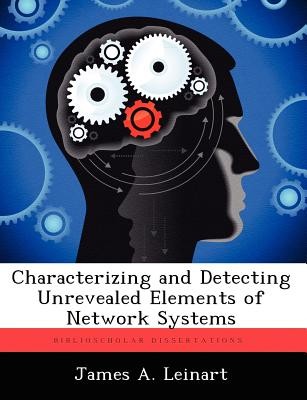
- We will send in 10–14 business days.
- Author: James A Leinart
- Publisher: BiblioScholar
- ISBN-10: 1249594790
- ISBN-13: 9781249594796
- Format: 18.9 x 24.6 x 0.9 cm, minkšti viršeliai
- Language: English
- SAVE -10% with code: EXTRA
Characterizing and Detecting Unrevealed Elements of Network Systems (e-book) (used book) | bookbook.eu
Reviews
Description
This dissertation addresses the problem of discovering and characterizing unknown elements in network systems. It is not uncommon to have incomplete knowledge of network systems due to either passive circumstances, e.g. limited resources to observe a network, or active circumstances, e.g. intentional acts of concealment, or some combination of active and passive influences. This research suggests statistical and graph theoretic approaches for such situations, including those in which nodes are causally related. A related aspect of this research is accuracy assessment. It is possible an analyst could fail to detect a network element, or be aware of network elements, but incorrectly conclude the associated network system structure. Consequently, this dissertation provides a framework to evaluate accuracy.
EXTRA 10 % discount with code: EXTRA
The promotion ends in 23d.19:13:58
The discount code is valid when purchasing from 10 €. Discounts do not stack.
- Author: James A Leinart
- Publisher: BiblioScholar
- ISBN-10: 1249594790
- ISBN-13: 9781249594796
- Format: 18.9 x 24.6 x 0.9 cm, minkšti viršeliai
- Language: English English
This dissertation addresses the problem of discovering and characterizing unknown elements in network systems. It is not uncommon to have incomplete knowledge of network systems due to either passive circumstances, e.g. limited resources to observe a network, or active circumstances, e.g. intentional acts of concealment, or some combination of active and passive influences. This research suggests statistical and graph theoretic approaches for such situations, including those in which nodes are causally related. A related aspect of this research is accuracy assessment. It is possible an analyst could fail to detect a network element, or be aware of network elements, but incorrectly conclude the associated network system structure. Consequently, this dissertation provides a framework to evaluate accuracy.


Reviews